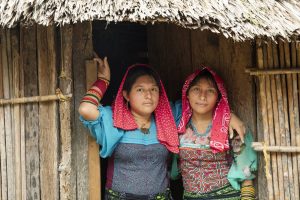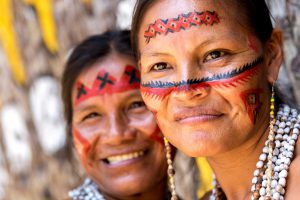Gender is a basic factor of social relations and rights in Indigenous Peoples and local communities. Together with class, ethnicity, and caste, gender determines to a great extent a person’s opportunity, and status in the community.
The Tenure Facility supports women to play a greater role in the management and maintenance of community lands and natural resources, which can in turn have a significant positive impact on climate change mitigation, and community livelihood opportunities.
Women are daily managers of community lands and are usually involved in land-based work essential for the food security, economic viability, and cultural heritage of their communities. Secure land rights for women result in health and education improvements, both for women themselves, and the wider population. Women within indigenous and local communities often possess distinct knowledge regarding forest resources, and their decisions regarding resource use have a significant impact on the maintenance of biodiversity, and the reduction of forest carbon emissions.

Despite this potential to improve outcomes for women, their families, and whole communities, land rights are still not equitably distributed to all. Instead, discriminatory traditional customs and practices, and limited access to justice and education leave millions of women unable to exercise their rights to the land they depend on for a living, even when those rights are protected by law. Formal legal systems in many countries have constitutions or land laws that grant gender equality in access to land in theory, but in reality this legislation is often not enforced, or is contradicted by laws for marriage, divorce and inheritance which discriminate against women and daughters.
The implementation of laws recognising women’s community-based tenure rights require coordinated efforts across multiple sectors that are tailored to communities’ realities and reflective of the priorities of indigenous and rural women. The UN Sustainable Development Goals (SDGs) have specifically named land tenure rights in SDGs 1, 2, and 5, relating to poverty, food security, and gender equality, recognising their fundamental importance in improving lives and livelihoods. Land is implicated in SDGs 10, 11, 13, 15, and 16, relating to inequality, sustainable cities, climate change, land degradation, and strong governance; land is an “ecosystem” within the SDGs.
The Tenure Facility tailors its gender mainstreaming approach to the partners’ needs and cultural realities. Respectful of different social perspectives on gender balance, the Tenure Facility strives to make gender dialogue a natural part of securing tenure. The road to fully respecting women’s rights in law and in practice is long, but local, national, and global commitments to improve and uphold women’s tenure rights are only growing.
